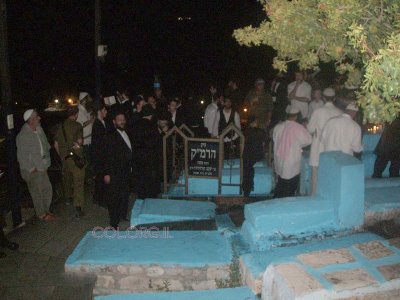Today, 5 Menachem Av, is the yahrzeit of the Arizal HaKodesh, the Holy Ari who is buried in Tzfat.
from Kabbalah Online:
Rabbi Yitzchak Luria was undisputedly the greatest practitioner and expounder of Kabbala since Rabbi Shimon bar Yochai, author of the
Zohar. Rabbi Yitzchak Luria founded a new school in Kabbalistic thought, known as "the system of the Ari."
Rabbi Yitzchak Luria ben Shlomo Ashkenazi, whose father was related to the famous Maharshal, was born in the Old City of Jerusalem in 5294 (1534) in what is now the Old Yishuv Court Museum, and passed away on the 5th of Av 5332 (1572 CE). He is buried in the Old Cemetery of Safed, where tens of thousands make the pilgrimage to his graveside every year.
Rabbi Yitzchak Luria is commonly known as the Ari, an acronym standing for Elo-ki Rabbi Yitzchak, the G-dly Rabbi Isaac. No other master or sage ever had this extra letter aleph, an abbreviation for Elo-ki [G--dly] prefacing his name. This was a sign of the esteem in which his contemporaries held him. Later generations, fearful that this appellation might be misunderstood, substituted Ashkenazi, his family name, for the aleph, indicating that his family had originated in Germany, as indeed it had. Alternatively, some explain that the aleph stands for Adoneinu, "our master." To this day among Kabbalists, Rabbi Yitzchak Luria is only referred to as Rabbeinu HaAri, HaAri HaKadosh (the holy Ari), the Ari (which also means "lion"), or the Arizal (the Ari, of blessed memory).
***
from Reb Chaim HaQoton’s blog:
The term “song” as used in the Holy Scriptures (
Shir and/or
Shira) refers not only to mere singing, but also to a unique type of spiritual phenomenon. A song is the manifestation of feelings into vocalized words, which represent a spiritual connection to esoteric concepts; songs reflect a belief of the intellect fused with the subconscious righteousness of the soul. Songs are especially used to commemorate happy occasions or to express one’s emotion during a joyous occasion. The core focus of a song’s content usually speaks the praises of G-d, but the actual circumstances behind the cause of the thanksgiving are also mentioned within the song. According to
Lurianic Kabbalah (from the teachings of
Rabbi Yitzchak "Ari HaKadosh" Luria, 1534–1572), there are eleven expressions of song—admitting/acknowledging thanks, praising, lauding, glorifying, extolling, beautifying, blessing, eternalizing His victory, exulting, and exalting. (These eleven expressions are mentioned in the Passover
Haggada, at the end of the
Psukei D’Zimra “Chapters of Hymns” services on Shabbos and Yom Tov, and at the concluding benediction of
Hallel. Those who disagree with the
Ari HaKodosh omit “eternalizing His victory”.) Conversely, song is included in the fifteen languages of praise: Song, laud, praise, music (hymns), strength, rulership, triumph, greatness, powerfulness, epitome of praise, splendor, holiness, kingship, blessings, and acknowledgments of thanksgiving. (These fifteen expressions are mentioned daily in the
Yishtabach prayer) Thus, song is an expression of praise, and praise is an expression of song; this is because the
raison d’etre of song is to be used as a means of expressing praise to the Almighty.
***
 the crowd at the Arizal's kever last night
the crowd at the Arizal's kever last night
Although the Israeli Home Front Command had asked that the public refrain from coming to Tzfas today for the Arizal’s yahrzeit, hundreds of determined people visited his kever [gravesite] throughout the night last night. Among the visitors were R. Elazar Koenig, spiritual leader of the Breslov Chassidim in Tzfas, and the Makover Rebbe, who lives in Kiryat Atta [near Haifa]. There were prayers on behalf of the inhabitants of Northern Israel, as well as for the success and protection of the forces engaged in the current war. Because of the Home Front Command’s request, no arrangements were made for the visitors; but after many people came nonetheless, lighting around the gravesite was arranged.
A friend of mine in Tzfas writes: The Yahrzeit of the Arizal is today. Some people are coming into town to walk down to the Tzfas cemetery and pray at his kever [grave]. I imagine a large number of the locals will be there throughout the day. Breslov had their annual big seuda [meal] in honor of the Arizal, at 7 a.m. this morning.
Zechuso yagein Aleinu – may the Arizal’s merit protect the inhabitants of Tzfas, the North, and all of the Jewish People!
# posted by yitz @ 2:22 PM

 the crowd at the Arizal's kever last night
the crowd at the Arizal's kever last night